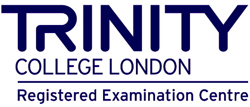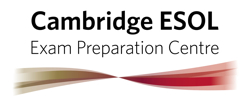We offer language courses in all the levels from A1 to C2 of the Common European Framework of Reference for Languages.
Preparing employees for official language exams
There are internationally recognized exams that accredit one’s skills in a particular language. After one, two or various years of studying a language, many of us would like a certificate to accredit our language level in the working world.
For this reason, many of our clients offer their employees the possibility of taking an official exam to demonstrate their knowledge, and at the same time establish clear objectives for the course.

Oxford House is a registered Trinity examination centre. All of our English students have the option to take the oral Trinity GESE exam, which is internationally recognized and takes place at our language school each June.

We are also a
Cambridge ESOL exam preparation centre. We offer both intensive and long-term courses to prepare for the FCE (First Certificate of English), the CAE (Certificate of Advanced English) and the CPE (Certificate of Proficiency in English).
If you would like to offer your employees the opportunity to take an official exam, contact the Director of Studies. The teacher will prepare a program of study to prepare your employees to pass the chosen exam.
Recognized language certifications integrated with the Common European Framework
| Accrediting organization → |
Trinity College London |
University of Cambridge |
Instituto Cervantes |
Generalitat de Catalunya |
Institut Français |
| Common European Framework |
GESE English exam |
English certificate |
Spanish DELE diploma |
Catalán certificate |
French diplomas |
| C2 |
12 |
CPE |
Nivel superior |
Nivell superior |
DALF C2 |
| C1 |
10-11,ISE III |
CAE |
|
Nivell de suficiència |
DALF C1 |
| B2 |
7-9,ISE II |
FCE |
Nivel intermedio |
Nivell intermedi |
DELF B2 |
| B1 |
5-6,ISE I |
PET |
Nivel inicial |
|
DELF B1 |
| A2 |
3-4 |
KET |
|
Nivell elemental |
DELF A2 |
| A1+ |
2-3 |
|
|
Nivell bàsic |
|
| A1 |
1-2 |
|
|
|
DELF A1 |
Common European Framework levels
The Common European Framework outlines the following abilities expected of students at each level.
Can understand and use familiar everyday expressions and very basic phrases aimed at the satisfaction of needs of a concrete type. Can introduce him/herself and others and can ask and answer questions about personal details such as where he/she lives, people he/she knows and things he/she has. Can interact in a simple way provided the other person talks slowly and clearly and is prepared to help.
Can understand sentences and frequently used expressions related to areas of most immediate relevance (e.g. very basic personal and family information, shopping, local geography, employment). Can communicate in simple and routine tasks requiring a simple and direct exchange of information on familiar and routine matters. Can describe in simple terms aspects of his/her background, immediate environment and matters in areas of immediate need.
Can understand the main points of clear standard input on familiar matters regularly encountered in work, school, leisure, etc. Can deal with most situations likely to arise whilst travelling in an area where the language is spoken. Can produce simple connected text on topics which are familiar or of personal interest. Can describe experiences and events, dreams, hopes ambitions and briefly give reasons and explanations for opinions and plans.
Can understand the main ideas of complex text on both concrete and abstract topics, including technical discussions in his/her field of specialisation. Can interact with a degree of fluency and spontaneity that makes regular interaction with native speakers quite possible without strain for either party. Can produce clear, detailed text on a wide range of subjects and explain a viewpoint on a topical issue giving the advantages and disadvantages of various options.
Can understand a wide range of demanding, longer texts, and recognise implicit meaning. Can express him/herself fluently and spontaneously without much obvious searching for expressions. Can use language flexibly and effectively for social, academic and professional purposes. Can produce clear, well-structured, detailed text on complex subjects, showing controlled use of organisational patterns, connectors and cohesive devices.
Can understand with ease virtually everything heard or read. Can summarise information from different spoken and written sources, reconstructing arguments and accounts in a coherent presentation. Can express him/herself spontaneously, very fluently and precisely, differentiating finer shades of meaning even in the most complex situations.
 Oxford House is a registered Trinity examination centre. All of our English students have the option to take the oral Trinity GESE exam, which is internationally recognized and takes place at our language school each June.
Oxford House is a registered Trinity examination centre. All of our English students have the option to take the oral Trinity GESE exam, which is internationally recognized and takes place at our language school each June.


